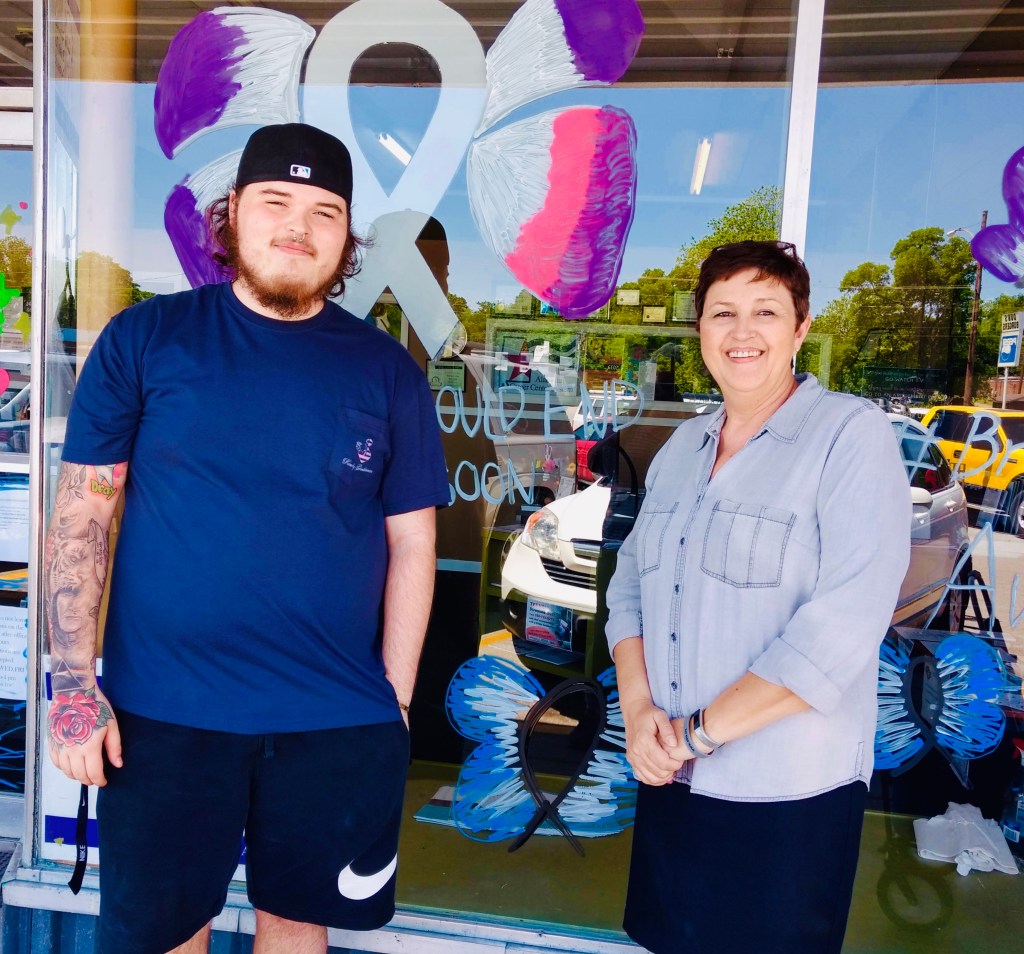BRAIN TUMOR AWARENESS MONTH: Suvivor shares story, mission
Published 6:15 am Friday, May 17, 2019

- Carla Sims, right, and her nephew, Kolton Romine, painted the windows of the Athens-Limestone Family Resource Center in Athens Thursday to remind residents that May is Brain Tumor Awareness Month. T-shirts are available for purchase, with proceeds going to the American Brain Tumor Association. She shares her story, some of the symptoms and how to be your own advocate and get the best care.
Carla Sims’ symptoms just kept piling up over a two-year period.
“I was having major headaches, balance issues, vision issues, a little paralysis on one side,” said the Athens resident. “My memory was affected, my cognitive abilities were shot.”
Trending
When talking to family members and others about her symptoms, she said she felt like she was going crazy.
But she wasn’t. Something was wrong, but no doctor had found it yet.
“Then I had a seizure at work,” Sims said.
It was the seizure that led to the tests needed to diagnose her brain tumor — a meningioma. Meningiomas are tumors that forms on the membranes that cover the brain and spinal cord just inside the skull. The tumors are often slow-growing and as many as 90% are benign.
Symptoms
Symptoms of a brain tumor can vary depending on the tumor’s size, type and location. Common signs and symptoms include headache, fatigue, focal symptoms, memory loss, mood swings, personality changes, depression, seizures and mass effect, which includes nausea, vomiting, drowsiness, vision problems, headaches and behavior changes.
Trending
Sims had a single meningioma between the skull and the brain that was putting pressure on her brain. Although she had only one, some people have multiple tumors at one time and some get repeated meningiomas.
When the doctor announced it was a brain tumor, her family members were devastated, but Sims was relieved to know what it was, she said.
“My family was breaking down and I was thinking, ‘Why are you so upset?'” Sims recalled.
The right stuff
After going to Birmingham and Nashville and back to Huntsville, she finally found a neurosurgeon who did tests and thought she should remove the meningioma. She had the surgery last August.
While she knew it was a brain tumor, she didn’t yet know for sure what kind until she had a craniotomy — a surgical removal of part of the bone from the skull to expose the brain. The procedure was required to remove the tumor so it could be tested.
While still in the ICU after brain surgery, her older sister could immediately detect a personality change in Sims.
“My older sister said, ‘Once you spoke in the ICU, I knew we had you back,'” Sims said.
In addition to surgery, Sims underwent radiation therapy. Almost immediately, Sims’ headaches and other symptoms disappeared. She went from wearing a bifocal back to a single prescription lens.
Helping others
She returned to work at the Council on Aging in Athens after missing only three weeks. She is the Senior Rx and shift coordinator, and she helps seniors find the correct Part D Medicare plan.
“Once I felt better, I just wanted to do something,” Sims said.
She wanted to spread public awareness about brain tumor symptoms, resources available to help those with brain tumors and her belief that each patient should be their own advocate. She doesn’t want anyone to go through what she did in waiting so long to get a diagnosis.
To that end, Sims is selling gray T-shirts that promote Brain Tumor Awareness Month in May. Gotcha Covered Screen Printing and More in Athens helped her design and print them. The shirts can be ordered at the Athens-Limestone Family Resource Center, next to Dub’s Burgers, in Athens. Proceeds go to the American Brain Tumor Association, which offers all kinds of information and answers to questions about brain tumors, she said.
“They are so helpful,” Sims said. “They even shared my story on their website.”
She is also actively involved with Meningioma Mommas and Papas, a 10,000-member support group for people with any kind of brain tumor.
“It is a very life-altering experience (having a brain tumor); your life is forever changed,” Sims said.
On Thursday, she and her nephew, Kolton Romine, painted the windows of the Athens-Limestone County Family Resources Center in Athens with messages about Brain Tumor Awareness Month in May.
While they were painting, a girl emerged from Dub’s Burgers next door who mentioned she had a brain tumor. Sims gave her the information about the ABTA and the website.
Her best lesson
One of her main goals is telling others to alway be their own advocate.
“If you don’t feel like what a doctor tells you is right or if they want to prolong or wait, don’t give up. Keep looking. Demand what you feel is the right answer.”
She said she wasted several months in Birmingham and was terrified of having the doctor do surgery on her.
“If you know something is going on, keep looking until you get answers,” she said. “Find someone who listens to you and really wants to help you.”






